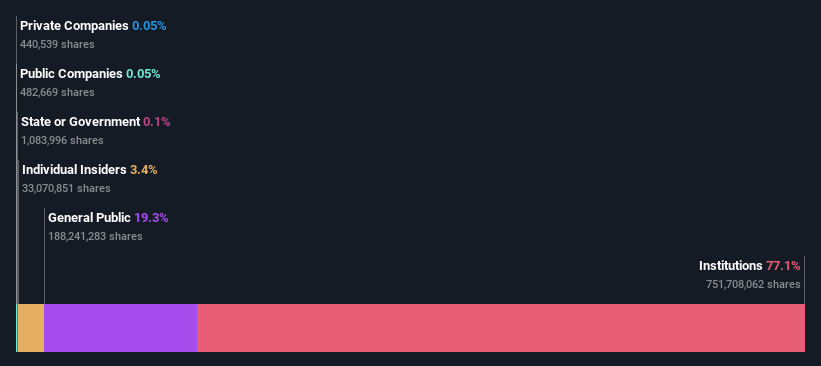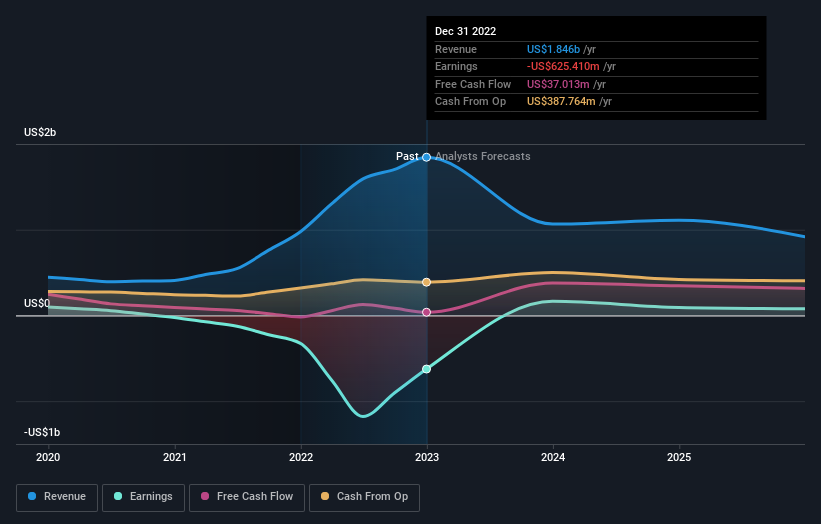- United Kingdom
- /
- Oil and Gas
- /
- LSE:DEC
Diversified Energy Company PLC (LON:DEC) institutional owners may be pleased with recent gains after 14% loss over the past year

Key Insights
- Given the large stake in the stock by institutions, Diversified Energy's stock price might be vulnerable to their trading decisions
- 51% of the business is held by the top 15 shareholders
- Recent purchases by insiders
To get a sense of who is truly in control of Diversified Energy Company PLC (LON:DEC), it is important to understand the ownership structure of the business. With 77% stake, institutions possess the maximum shares in the company. That is, the group stands to benefit the most if the stock rises (or lose the most if there is a downturn).
Institutional investors would appreciate the 8.0% increase in share prices last week, given their one-year returns have been disappointing at 14%.
Let's take a closer look to see what the different types of shareholders can tell us about Diversified Energy.
See our latest analysis for Diversified Energy

What Does The Institutional Ownership Tell Us About Diversified Energy?
Institutions typically measure themselves against a benchmark when reporting to their own investors, so they often become more enthusiastic about a stock once it's included in a major index. We would expect most companies to have some institutions on the register, especially if they are growing.
As you can see, institutional investors have a fair amount of stake in Diversified Energy. This suggests some credibility amongst professional investors. But we can't rely on that fact alone since institutions make bad investments sometimes, just like everyone does. It is not uncommon to see a big share price drop if two large institutional investors try to sell out of a stock at the same time. So it is worth checking the past earnings trajectory of Diversified Energy, (below). Of course, keep in mind that there are other factors to consider, too.

Since institutional investors own more than half the issued stock, the board will likely have to pay attention to their preferences. Diversified Energy is not owned by hedge funds. Our data shows that M&G Investment Management Limited is the largest shareholder with 6.6% of shares outstanding. In comparison, the second and third largest shareholders hold about 5.0% and 4.9% of the stock. In addition, we found that Robert Hutson, the CEO has 2.5% of the shares allocated to their name.
After doing some more digging, we found that the top 15 have the combined ownership of 51% in the company, suggesting that no single shareholder has significant control over the company.
While it makes sense to study institutional ownership data for a company, it also makes sense to study analyst sentiments to know which way the wind is blowing. There are a reasonable number of analysts covering the stock, so it might be useful to find out their aggregate view on the future.
Insider Ownership Of Diversified Energy
The definition of company insiders can be subjective and does vary between jurisdictions. Our data reflects individual insiders, capturing board members at the very least. The company management answer to the board and the latter should represent the interests of shareholders. Notably, sometimes top-level managers are on the board themselves.
Insider ownership is positive when it signals leadership are thinking like the true owners of the company. However, high insider ownership can also give immense power to a small group within the company. This can be negative in some circumstances.
Our most recent data indicates that insiders own some shares in Diversified Energy Company PLC. The insiders have a meaningful stake worth UK£32m. Most would see this as a real positive. Most would say this shows alignment of interests between shareholders and the board. Still, it might be worth checking if those insiders have been selling.
General Public Ownership
The general public-- including retail investors -- own 19% stake in the company, and hence can't easily be ignored. This size of ownership, while considerable, may not be enough to change company policy if the decision is not in sync with other large shareholders.
Next Steps:
While it is well worth considering the different groups that own a company, there are other factors that are even more important. For instance, we've identified 3 warning signs for Diversified Energy (2 shouldn't be ignored) that you should be aware of.
Ultimately the future is most important. You can access this free report on analyst forecasts for the company.
NB: Figures in this article are calculated using data from the last twelve months, which refer to the 12-month period ending on the last date of the month the financial statement is dated. This may not be consistent with full year annual report figures.
New: Manage All Your Stock Portfolios in One Place
We've created the ultimate portfolio companion for stock investors, and it's free.
• Connect an unlimited number of Portfolios and see your total in one currency
• Be alerted to new Warning Signs or Risks via email or mobile
• Track the Fair Value of your stocks
Have feedback on this article? Concerned about the content? Get in touch with us directly. Alternatively, email editorial-team (at) simplywallst.com.
This article by Simply Wall St is general in nature. We provide commentary based on historical data and analyst forecasts only using an unbiased methodology and our articles are not intended to be financial advice. It does not constitute a recommendation to buy or sell any stock, and does not take account of your objectives, or your financial situation. We aim to bring you long-term focused analysis driven by fundamental data. Note that our analysis may not factor in the latest price-sensitive company announcements or qualitative material. Simply Wall St has no position in any stocks mentioned.
About LSE:DEC
Diversified Energy
Operates as an independent owner and operator of producing natural gas and oil wells primarily in the Appalachian Basin of the United States.
Undervalued with reasonable growth potential.
Similar Companies
Market Insights
Community Narratives



